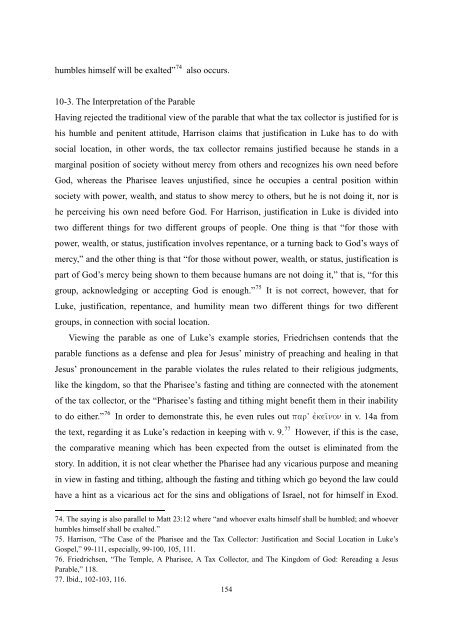the role of the lukan parables in terms of the purpose of luke's gospel
the role of the lukan parables in terms of the purpose of luke's gospel
the role of the lukan parables in terms of the purpose of luke's gospel
Create successful ePaper yourself
Turn your PDF publications into a flip-book with our unique Google optimized e-Paper software.
humbles himself will be exalted” 74<br />
10-3. The Interpretation <strong>of</strong> <strong>the</strong> Parable<br />
also occurs.<br />
Hav<strong>in</strong>g rejected <strong>the</strong> traditional view <strong>of</strong> <strong>the</strong> parable that what <strong>the</strong> tax collector is justified for is<br />
his humble and penitent attitude, Harrison claims that justification <strong>in</strong> Luke has to do with<br />
social location, <strong>in</strong> o<strong>the</strong>r words, <strong>the</strong> tax collector rema<strong>in</strong>s justified because he stands <strong>in</strong> a<br />
marg<strong>in</strong>al position <strong>of</strong> society without mercy from o<strong>the</strong>rs and recognizes his own need before<br />
God, whereas <strong>the</strong> Pharisee leaves unjustified, s<strong>in</strong>ce he occupies a central position with<strong>in</strong><br />
society with power, wealth, and status to show mercy to o<strong>the</strong>rs, but he is not do<strong>in</strong>g it, nor is<br />
he perceiv<strong>in</strong>g his own need before God. For Harrison, justification <strong>in</strong> Luke is divided <strong>in</strong>to<br />
two different th<strong>in</strong>gs for two different groups <strong>of</strong> people. One th<strong>in</strong>g is that “for those with<br />
power, wealth, or status, justification <strong>in</strong>volves repentance, or a turn<strong>in</strong>g back to God’s ways <strong>of</strong><br />
mercy,” and <strong>the</strong> o<strong>the</strong>r th<strong>in</strong>g is that “for those without power, wealth, or status, justification is<br />
part <strong>of</strong> God’s mercy be<strong>in</strong>g shown to <strong>the</strong>m because humans are not do<strong>in</strong>g it,” that is, “for this<br />
75<br />
group, acknowledg<strong>in</strong>g or accept<strong>in</strong>g God is enough.” It is not correct, however, that for<br />
Luke, justification, repentance, and humility mean two different th<strong>in</strong>gs for two different<br />
groups, <strong>in</strong> connection with social location.<br />
View<strong>in</strong>g <strong>the</strong> parable as one <strong>of</strong> Luke’s example stories, Friedrichsen contends that <strong>the</strong><br />
parable functions as a defense and plea for Jesus’ m<strong>in</strong>istry <strong>of</strong> preach<strong>in</strong>g and heal<strong>in</strong>g <strong>in</strong> that<br />
Jesus’ pronouncement <strong>in</strong> <strong>the</strong> parable violates <strong>the</strong> rules related to <strong>the</strong>ir religious judgments,<br />
like <strong>the</strong> k<strong>in</strong>gdom, so that <strong>the</strong> Pharisee’s fast<strong>in</strong>g and tith<strong>in</strong>g are connected with <strong>the</strong> atonement<br />
<strong>of</strong> <strong>the</strong> tax collector, or <strong>the</strong> “Pharisee’s fast<strong>in</strong>g and tith<strong>in</strong>g might benefit <strong>the</strong>m <strong>in</strong> <strong>the</strong>ir <strong>in</strong>ability<br />
76<br />
to do ei<strong>the</strong>r.” In order to demonstrate this, he even rules out <strong>in</strong> v. 14a from<br />
<strong>the</strong> text, regard<strong>in</strong>g it as Luke’s redaction <strong>in</strong> keep<strong>in</strong>g with v. 9. 77<br />
However, if this is <strong>the</strong> case,<br />
<strong>the</strong> comparative mean<strong>in</strong>g which has been expected from <strong>the</strong> outset is elim<strong>in</strong>ated from <strong>the</strong><br />
story. In addition, it is not clear whe<strong>the</strong>r <strong>the</strong> Pharisee had any vicarious <strong>purpose</strong> and mean<strong>in</strong>g<br />
<strong>in</strong> view <strong>in</strong> fast<strong>in</strong>g and tith<strong>in</strong>g, although <strong>the</strong> fast<strong>in</strong>g and tith<strong>in</strong>g which go beyond <strong>the</strong> law could<br />
have a h<strong>in</strong>t as a vicarious act for <strong>the</strong> s<strong>in</strong>s and obligations <strong>of</strong> Israel, not for himself <strong>in</strong> Exod.<br />
74. The say<strong>in</strong>g is also parallel to Matt 23:12 where “and whoever exalts himself shall be humbled; and whoever<br />
humbles himself shall be exalted.”<br />
75. Harrison, “The Case <strong>of</strong> <strong>the</strong> Pharisee and <strong>the</strong> Tax Collector: Justification and Social Location <strong>in</strong> Luke’s<br />
Gospel,” 99-111, especially, 99-100, 105, 111.<br />
76. Friedrichsen, “The Temple, A Pharisee, A Tax Collector, and The K<strong>in</strong>gdom <strong>of</strong> God: Reread<strong>in</strong>g a Jesus<br />
Parable,” 118.<br />
77. Ibid., 102-103, 116.<br />
154
















